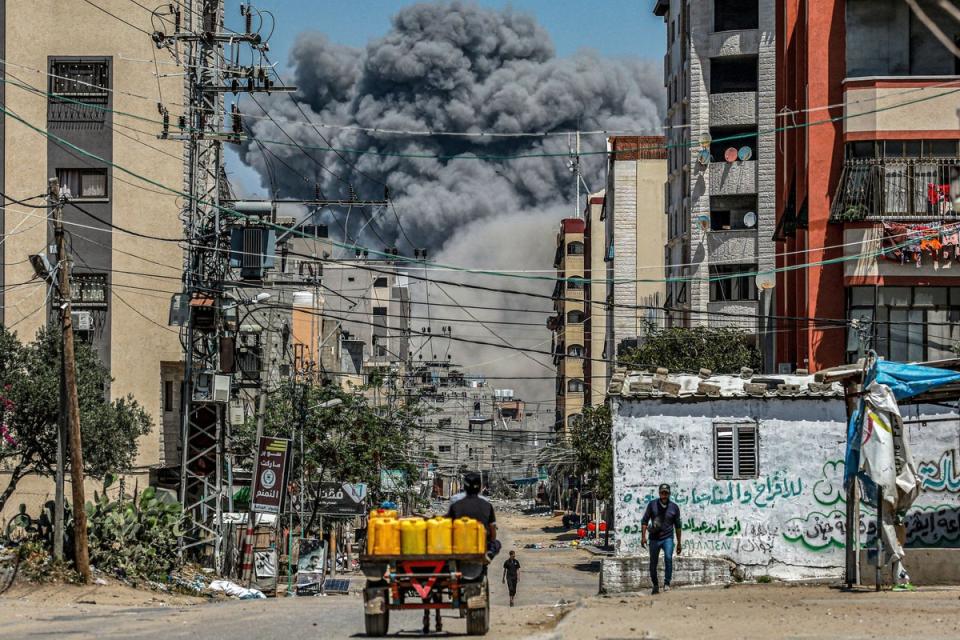UK warning Israel but 'doesn't actually do anything about it', aid chiefs say after harrowing visit to Gaza

Britain’s Government is failing to back up its criticism about Israel’s conflict in Gaza with action, according to aid chiefs who described on Monday harrowing accounts of suffering in the war zone.
Medical Aid for Palestinians (MAP) chief executive Melanie Ward said that a “human slaughter” awaits if Israeli Prime Minister Benjamin Netanyahu delivers on his threats to launch a ground offensive in the city of Rafah.
She said there had been a “change of tone” from Britain towards the Netanyahu government since Lord Cameron was appointed Foreign Secretary a month after the Hamas slaughter of Israeli civilians on October 7, “but not much change in actual policy”.
“And one of the things that I think is most frustrating about the situation is that the British Government talks about the situation in Gaza, the need to get more aid in, but it doesn't actually do anything about it,” said Ms Ward, who is a former Labour parliamentary candidate in Scotland.
Lord Cameron has been issuing increasingly strong warnings to Mr Netanyahu’s government to allow in far greater amounts of aid to Gaza, to turn its water supply back on and to refrain from an assault on Rafah, where more than two million people have taken shelter from the fighting further north.
Ms Ward and International Rescue Committee (IRC) vice president of emergencies Bob Kitchen briefed reporters after recently returning from Gaza along with two London-based surgeons, Khaled Dawas and Mahim Qureshi.
The surgeons described chaotic and unsanitary conditions as they operated on Palestinians suffering from life-threatening wounds to their heads, torsos and limbs after Israeli air strikes.
Dr Qureshi of Charing Cross Hospital said: “Doctors were doing their absolute best to treat them but in addition, we are now seeing the effects of complete lack of healthcare for the last six to seven months on the population.
“That means that we have patients that have been deprived of basic care and are now presenting with advanced diseases that could have very easily been curable months ago, and they are losing their lives and their limbs as a consequence of that,” she said.
“And even if there were a ceasefire today, the ongoing effects of that lack of health care will be evident for years and years to come.”
Israel maintains that Hamas fighters have used civilians as human shields and have taken over hospitals in Gaza as nerve centres for their terrorist operations.
Mr Kitchen said: “I didn't personally see any evidence of Hamas, any individuals or fighters. I'll say that I've worked in essentially all of the war zones the world has had over the last 25 years. And I've never seen a war zone with so few guns.”
He added: “During that time I've not seen another example of where two million people have been cornered, slaughtered, and now starved.
“And the world is essentially inert where usually there would be outrage, we would be using all of the political and economic tools and sanctions available to us,” Mr Kitchen said, protesting at continued arms sales to Israel by Britain and the United States.
Ms Ward said the density of the refugee population crowded into Rafah and other parts of Gaza was “absolutely staggering”.
“And that's really problematic for many reasons, partly because there's a huge problem with sanitation. Everywhere you go in Gaza the stench of raw sewage follows you,” she said, warning that that is creating more health risks such as hepatitis A.
The Foreign Office was contacted for comment. Israel denies targeting civilians in Gaza and insists that Hamas could end the war by returning dozens of hostages it seized on October 7 when its fighters massacred 1,200 people.
Israel’s resultant invasion in Gaza is now in its seventh month and has claimed more than 34,000 Palestinian lives, according to local health officials, devastating much of the coastal strip and triggering warnings by aid agencies of famine.

 Yahoo Sport
Yahoo Sport 





































